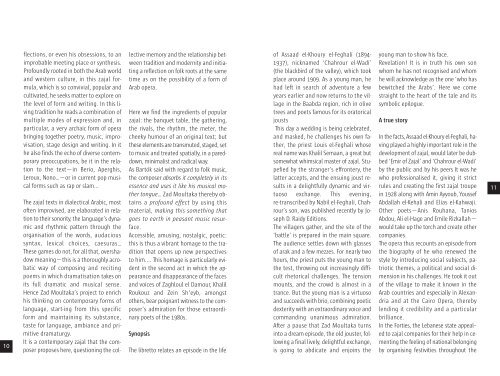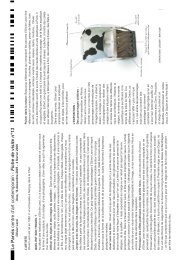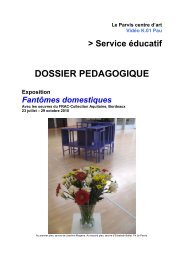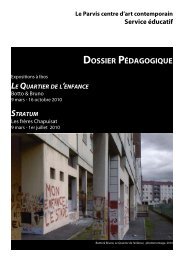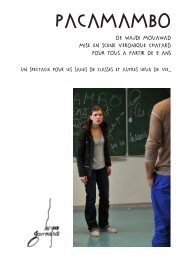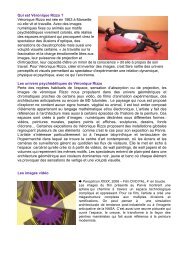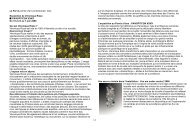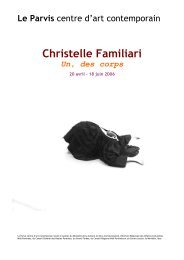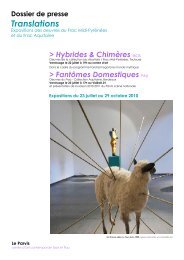Create successful ePaper yourself
Turn your PDF publications into a flip-book with our unique Google optimized e-Paper software.
10<br />
flections, or even his obsessions, to an<br />
improbable meeting place or synthesis.<br />
Profoundly rooted in both the Arab world<br />
and western culture, in this zajal formula,<br />
which is so convivial, popular and<br />
cultivated, he seeks matter to explore on<br />
the level of form and writing. In this living<br />
tradition he reads a combination of<br />
multiple modes of expression and, in<br />
particular, a very archaic form of opera<br />
bringing together poetry, music, improvisation,<br />
stage design and writing. In it<br />
he also finds the echo of diverse contemporary<br />
preoccupations, be it in the relation<br />
to the text—in Berio, Aperghis,<br />
<strong>Le</strong>roux, Nono…—or in current pop musical<br />
forms such as rap or slam...<br />
The zajal texts in dialectical Arabic, most<br />
often improvised, are elaborated in relation<br />
to their sonority, the language’s dynamic<br />
and rhythmic pattern through the<br />
organisation of the words, audacious<br />
syntax, lexical choices, caesuras…<br />
These games do not, for all that, overshadow<br />
meaning—this is a thoroughly acrobatic<br />
way of composing and reciting<br />
poems in which dramatisation takes on<br />
its full dramatic and musical sense.<br />
Hence Zad Moultaka’s project to enrich<br />
his thinking on contemporary forms of<br />
language, start-ing from this specific<br />
form and maintaining its substance,<br />
taste for language, ambiance and primitive<br />
dramaturgy.<br />
It is a contemporary zajal that the composer<br />
proposes here, questioning the col-<br />
lective memory and the relationship between<br />
tradition and modernity and initiating<br />
a reflection on folk roots at the same<br />
time as on the possibility of a form of<br />
Arab opera.<br />
Here we find the ingredients of popular<br />
zajal: the banquet table, the gathering,<br />
the rivals, the rhythm, the meter, the<br />
cheeky humour of an original text; but<br />
these elements are transmuted, staged, set<br />
to music and treated spatially, in a pareddown,<br />
minimalist and radical way.<br />
As Bartók said with regard to folk music,<br />
the composer absorbs it completely in its<br />
essence and uses it like his musical mother<br />
tongue… Zad Moultaka thereby obtains<br />
a profound effect by using this<br />
material, making this something that<br />
goes to earth in peasant music resurface.<br />
Accessible, amusing, nostalgic, poetic:<br />
this is thus a vibrant homage to the tradition<br />
that opens up new perspectives<br />
to him.... This homage is particularly evident<br />
in the second act in which the appearance<br />
and disappearance of the faces<br />
and voices of Zaghloul el Damour, Khalil<br />
Roukouz and Zein Sh'eyb, amongst<br />
others, bear poignant witness to the composer’s<br />
admiration for those extraordinary<br />
poets of the 1980s.<br />
Synopsis<br />
The libretto relates an episode in the life<br />
of Assaad el-Khoury el-Feghali (1894-<br />
1937), nicknamed ‘Chahrour el-Wadi’<br />
(the blackbird of the valley), which took<br />
place around 1909. As a young man, he<br />
had left in search of adventure a few<br />
years earlier and now returns to the village<br />
in the Baabda region, rich in olive<br />
trees and poets famous for its oratorical<br />
jousts<br />
This day a wedding is being celebrated,<br />
and masked, he challenges his own father,<br />
the priest Louis el-Feghali whose<br />
real name was Khalil Semaan, a great but<br />
somewhat whimsical master of zajal. Stupefied<br />
by the stranger’s effrontery, the<br />
latter accepts, and the ensuing joust results<br />
in a delightfully dynamic and virtuoso<br />
exchange. This evening,<br />
re-transcribed by Nabil el-Feghali, Chahrour’s<br />
son, was published recently by Joseph<br />
D. Raidy Editions.<br />
The villagers gather, and the site of the<br />
‘battle’ is prepared in the main square.<br />
The audience settles down with glasses<br />
of arak and a few mezzes. For nearly two<br />
hours, the priest puts the young man to<br />
the test, throwing out increasingly difficult<br />
rhetorical challenges. The tension<br />
mounts, and the crowd is almost in a<br />
trance. But the young man is a virtuoso<br />
and succeeds with brio, combining poetic<br />
dexterity with an extraordinary voice and<br />
commanding unanimous admiration.<br />
After a pause that Zad Moultaka turns<br />
into a dream episode, the old jouster, following<br />
a final lively, delightful exchange,<br />
is going to abdicate and enjoins the<br />
young man to show his face.<br />
Revelation! It is in truth his own son<br />
whom he has not recognised and whom<br />
he will acknowledge as the one ‘who has<br />
bewitched the Arabs’. Here we come<br />
straight to the heart of the tale and its<br />
symbolic epilogue.<br />
A true story<br />
In the facts, Assaad el-Khoury el-Feghali, having<br />
played a highly important role in the<br />
development of zajal, would later be dubbed<br />
‘Emir of Zajal’ and ‘Chahrour el-Wadi’<br />
by the public and by his peers It was he<br />
who professionalised it, giving it strict<br />
rules and creating the first zajal troupe<br />
in 1928 along with Amin Ayyoub, Youssef<br />
Abdallah el-Kehali and Elias el-Kahwaji.<br />
Other poets—Anis Rouhana, Tanios<br />
Abdou, Ali el-Hage and Emile Rizkallah—<br />
would take up the torch and create other<br />
companies.<br />
The opera thus recounts an episode from<br />
the biography of he who renewed the<br />
style by introducing social subjects, patriotic<br />
themes, a political and social dimension<br />
in his challenges. He took it out<br />
of the village to make it known in the<br />
Arab countries and especially in Alexandria<br />
and at the Cairo Opera, thereby<br />
lending it credibility and a particular<br />
brilliance.<br />
In the Forties, the <strong>Le</strong>banese state appeal-ed<br />
to zajal companies for their help in cementing<br />
the feeling of national belonging<br />
by organising festivities throughout the<br />
11


